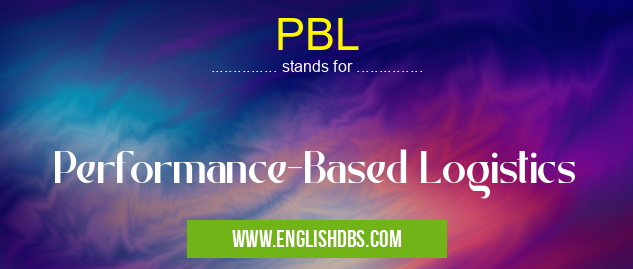What does PBL mean in TRANSPORTATION
Performance-Based Logistics (PBL) is a supply chain strategy that focuses on the whole life cycle of a product. This includes acquisition, inventory management, production, distribution and customer service. Through PBL, companies strive to create more efficient and effective operations while controlling costs and reducing waste.

PBL meaning in Transportation in Governmental
PBL mostly used in an acronym Transportation in Category Governmental that means Performance-Based Logistics
Shorthand: PBL,
Full Form: Performance-Based Logistics
For more information of "Performance-Based Logistics", see the section below.
Essential Questions and Answers on Performance-Based Logistics in "GOVERNMENTAL»TRANSPORTATION"
What is Performance-Based Logistics (PBL)?
Performance-Based Logistics (PBL) is a supply chain strategy that focuses on the whole life cycle of a product. This includes acquisition, inventory management, production, distribution and customer service.
How does PBL help reduce costs?
Through PBL, companies strive to create more efficient and effective operations while controlling costs and reducing waste. This helps to improve profitability for companies as well as provide customers with cost savings. Additionally, PBL enables organizations to identify areas of improvement in their processes that can lead to further cost savings.
How is PBL different from traditional logistics?
Traditional logistics is focused more on the short term aspects of the supply chain such as transportation and storage while PBL takes into account the entire product lifecycle when developing strategies. Additionally, PBL provides insights into opportunities for improving performance levels across all operations which allows for better decision making throughout the entire process.
What are some benefits of using PBL?
Some benefits include reduced total costs over time due to improved efficiency and performance levels; fewer delays in delivery times as processes become streamlined; increased customer satisfaction due to improved quality assurance; increased flexibility in addressing changes in demand; improved visibility across the entire supply chain; and better control over inventory levels.
Is there any down side to using this approach?
The only downside with using either traditional or PBL approaches may be upfront investment costs associated with implementing new technologies or processes that are necessary for successfully using this type of strategy. However, these investments will typically pay off in improved performance and cost savings over time.
Final Words:
As businesses become increasingly aware of the importance of optimizing their supply chains for long term success, Performance-Based Logistics (PBL) provides an effective solution by focusing on creating an efficient operation through careful planning and analysis throughout all phases of supply chain activities. Furthermore, businesses have much to gain through implementing this approach including improved operational performance along with reduced costs over time.
